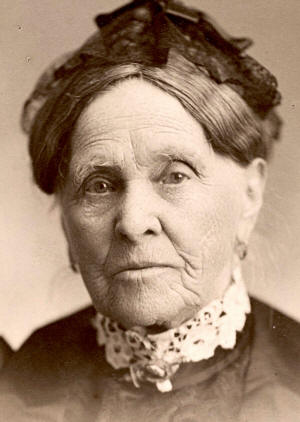|
Peorians lead list of
groundbreaking women
Voters in Illinois Top 200 project put
Lydia Moss Bradley, Betty Friedan at top of list
 Send a link to a friend
Send a link to a friend
 [October 26, 2018] [October 26, 2018]
Sorry, Oprah. Better luck next time, Mrs. Lincoln.
Voters in the Illinois Top 200 project have put Lydia Moss Bradley,
founder of Peoria’s Bradley University, at No. 1 on the list of
groundbreaking women in Illinois history.
Bradley and her husband built a fortune but lost six children. After
her husband’s death, Bradley did not retreat into the expected life
of a Victorian widow. She led businesses, set up charities, founded
a college and fought a land dispute all the way to the Supreme
Court. She also remarried, complete with a prenuptial agreement.
"As far as we know, Bradley is the only university in the U.S. that
was founded exclusively by a woman using her own resources. She was
so far ahead of her time and amazingly resourceful, even by today’s
standards. What an incredible woman Lydia Moss Bradley was. We
strive daily to carry on her legacy," said Bradley University
President Gary Roberts.
Bradley was followed by another Peorian, feminist writer Betty
Friedan, author of “The Feminine Mystique” and co-founder of the
National Organization for Women.
The top five also includes Jane Addams, winner of the Nobel Peace
Prize; former first lady Michelle Obama; and media mogul Oprah
Winfrey.

Here are the top 10 “groundbreaking women” chosen in online voting:
1. Lydia Moss Bradley – In 1875, she became the first woman
to serve on the board of a national bank. She was among the first to
demand a prenuptial contract before marriage. Bradley is in the
National Women’s Hall of Fame.
2. Betty Friedan – Friedan, a Peoria native, helped spark a
new wave of feminism with her 1963 book, “The Feminine Mystique.”
She also helped found the National Organization for Women.
3. Jane Addams –Addams was a pioneering social worker,
activist and advocate for women’s rights. She co-founded Chicago’s
Hull House, a center for educating and assisting the poor. She
received the Nobel Peace Prize in 1931.
4. Michelle Obama –Obama, a lawyer and writer, was the first
African-American first lady of the United States. She became a role
model for women and an advocate for poverty awareness, nutrition,
physical activity and healthy eating.
5. Oprah Winfrey – Winfrey is a talk show host, actress,
producer and philanthropist. She is best known for her Chicago-based
talk show, which was the highest-rated show of its kind in history.
6. Hillary Clinton – Raised in Illinois, Clinton was the
first woman nominated for president by a major political party. She
also served as U.S. secretary of state, U.S. senator from New York
and first lady of the United States.
7. Ida B. Wells – Born into slavery, Wells devoted her life
to fighting discrimination against African-Americans and women. She
helped call attention to the nation’s epidemic of lynching and was a
co-founder of the NAACP.
8. “Mother” Jones – After losing her family to yellow fever
and her business to the Chicago fire, this teacher and dressmaker
became a union organizer. Her motivational skills earned her the
label “most dangerous woman in America.”
9. Mary Lincoln – The wife of Abraham Lincoln, was a
well-educated, politically astute woman who helped her husband’s
political career. She endured the deaths of three sons and witnessed
the assassination of her husband.
[to top of second column] |

Lydia Moss Bradley

10. “Mother” Bickerdyke – This Galesburg resident devoted herself to
improving medical treatment for Civil War soldiers. She treated soldiers in 19
battles and established 300 field hospitals, ignoring any officers who got in
her way.
The nominees who did not make the top 10 were educator Zonia Baber; civil rights
leader Willie Barrow; pioneering lawyer Myra Bradwell; senator Carol Moseley
Braun; aviation pioneer Willa Brown; Chicago mayor Jane Byrne; social services
leader Fannie Emanuel; gay rights activist Vernita Gray; Alta May Hulett, who
fought to let women be lawyers; Mamie Till-Mobley, who drew national attention
to racist violence; Lottie Holman O’Neill, the state’s first female legislator;
labor activist Lucy Eldine Gonzalez Parsons; composer Florence Price; Native
American ballerina Maria TallChief; conservative activist Phyllis Schlafly; and
temperance crusader Frances Willard.
The Illinois Top 200 is a joint initiative of the Abraham Lincoln Presidential
Library and Museum, The (Springfield) State Journal-Register and the Illinois
Bicentennial Commission.
The Top 200 project lets Illinoisans vote every two weeks on the state’s most
inspiring leaders, greatest inventions, top businesses and much more. By the
state’s bicentennial on Dec. 3, voters will have chosen 10 favorites in 20
different categories – the Illinois Top 200.
The remaining categories are top leaders and unforgettable moments. Everyone is
invited to suggest possible nominees in each category by using the hashtag
#ILtop200 on social media.

The presidential library and museum uses a combination of rigorous scholarship
and high-tech showmanship to immerse visitors in Lincoln’s life and times.
Visitors can see ghosts come to life on stage, watch TV coverage of the 1860
Presidential election, roam through the Lincoln White House, experience booming
cannons in a Civil War battle and come face to face with priceless original
Lincoln artifacts.
The library holds an unparalleled collection of Lincoln books, documents,
photographs, artifacts and art, as well as some 12 million items pertaining to
all aspects of Illinois history.
For more information, visit
www. PresidentLincoln.illinois.gov.
ABOUT ILLINOIS BICENTENNIAL
On Dec. 3, 1818, Illinois became the 21st state in the union. The Illinois
Bicentennial is a yearlong celebration of what has been BORN, BUILT & GROWN in
the state and a reminder of why we are #IllinoisProud. Citizens are encouraged
to participate in the celebration by visiting
www.illinois 200.com and using
the hashtag #IllinoisProud. Partners and event and project managers planning
activities in 2018 can apply to become an official part of Illinois Bicentennial
by visiting the PARTICIPATE page at
www.illinois 200.com.
[Christopher Wills] |